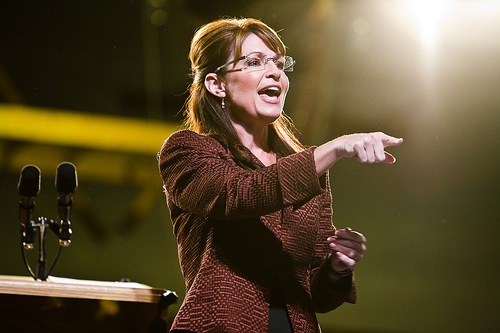While I was away on vacation (it was wonderful, thanks for asking), the Washington Post editorial page featured opinion pieces from Sarah Palin and George Will, two of conservatism’s leading, um, thinkers, revealing a great deal about the WaPo editorial page and the quality of conservative thinking.
Rebuttal has been ably carried out by many others, including Joe Romm (whose bald pate is belied by his youthful energy!). He demolishes Palin here and Will here.
Rather, a somewhat meta point. The debate over climate/energy legislation, at least as carried out between conservatives and everyone else, has taken on a surreal tinge. One might expect the media to respond, or notice, or react in some way, but outlets like the WaPo just keep carrying on as if the debate is perfectly normal.
The surreality comes from a simple fact: institutionally, as a movement and as a party, conservatives do not believe anthropogenic climate change exists. They don’t think the problem the legislation is designed to solve is actually a problem.
You might think this would make for short debates. Conservatives could collectively sign on to a one-line op-ed:
“We do not believe in anthropogenic climate change, thus we do not support legislation to address it.”
Period. Done. Right? But that doesn’t happen. Instead you get peculiarities like Palin, droning on for 700 words about how the legislation is flawed because it doesn’t promote domestic fossil fuel without once mentioning carbon emissions or climate change. You get Will analyzing the challenges of international climate negotiations and then mentioning, almost casually, at the end of his piece, “by the way, climate change isn’t real.”
But if climate change isn’t real, of course we shouldn’t be going through the wrenching process of trying to get off fossil fuels in a few short decades. Of course we shouldn’t be beating our heads against a wall trying to get China and India to agree to constrain their growth. It’s pointless even discussing those things.
If I simply refused to acknowledge the federal deficit, would Fred Hiatt have me on the WaPo editorial page analyzing the merits of deficit reduction proposals? Of course not. I don’t believe the $%*# thing exists! Of course I don’t support policies to reduce it.
By greenlighting Potemkin arguments about this or that climate policy from the likes of Palin and Will, the WaPo is giving conservatives a pass. Rejection of settled science is treated as a footnote. But without a shared set of facts, there are no rules, no constraints. Republicans can cavalierly demagogue anything Democrats offer, because hell, it’s all just funny talk, a game of make believe.
There will never be a policy proposal sensible enough to gain support from people who do not acknowledge the problem the proposal is meant to address. You’d think that fact would merit notice!
So here’s my modest proposal for Fred Hiatt and his ilk: Any conservative who writes about climate/energy legislation should be required to begin by stating clearly whether he or she believes the scientific consensus on warming. That fundamental fact colors everything else, so put it up front.
If they do not accept the science, then fine, let them tell us their preferred carbon-insensitive energy policy. Their fellow non-believers can debate the merits.
If they do accept the science, they can’t simply reject the moderate (and inadequate) Democratic proposals for addressing the problem contained in ACES. They have to tell us how they would solve the problem. That’s the benchmark.
That simple proposal won’t make the climate debate sensible — let’s be realistic about our ambitions — but it would move beyond the pretense that people like Palin and Will are involved in a good-faith debate.



